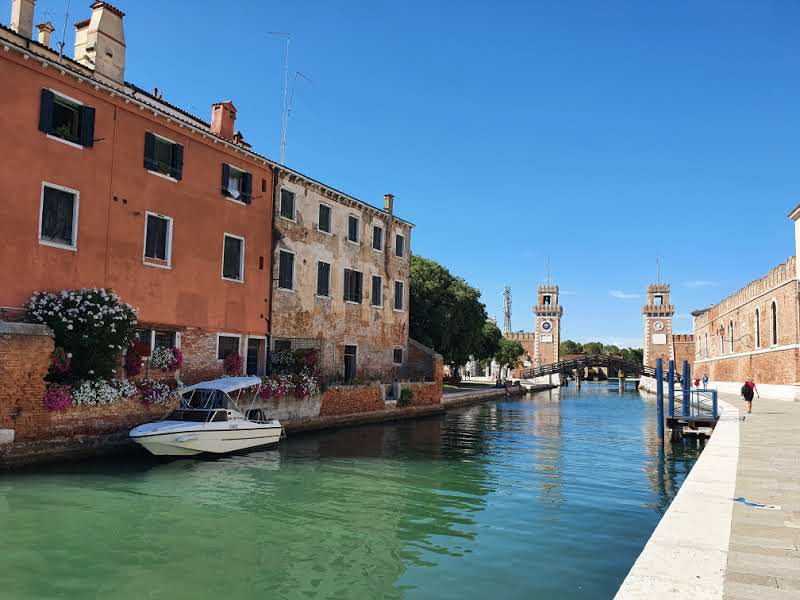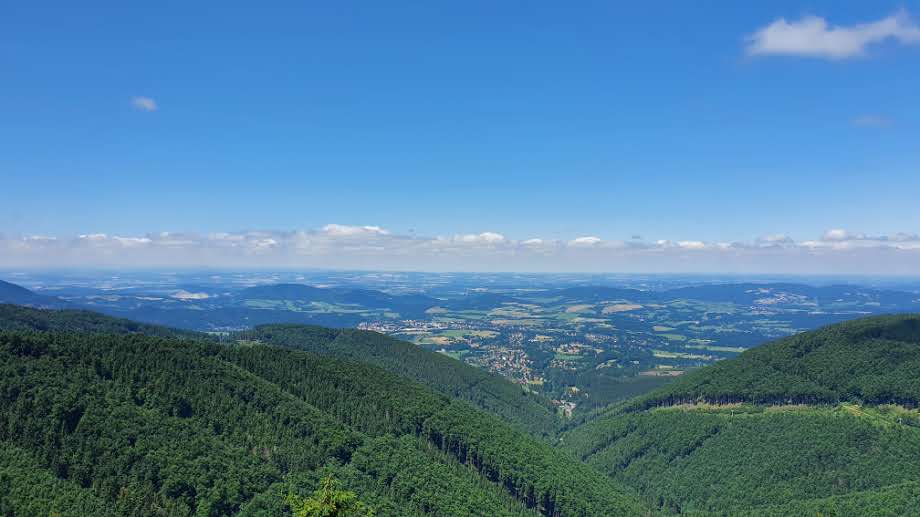Environment as a field of studies
UncategorizedLudovica is 24 years old girl from Italy who studies a programme called Environmental Humanities at Ca’ Foscari University of Venice. For her bachelors she studied cultural and linguistic mediation, a programme about literature and translation studies. She studied English, Russian, Spanish and a little bit of Chineese. She was thinking what she can do with those languages. She could just translate or she could use them to communicate something more. When she heard an advertisement in the radio about this brand new programme, she felt in her gut, that it’s for her. So she decided for a change of field and in the future she would like to use the languages to share gained knowledge about this hot topic which she was always interested in, but maybe not actively. “Of course I knew that the climate change is a real problem. But when you study you can actually understand all the connections of this really complex and wide issue which is really difficult to understand by yourself just from news for example. I was a little bit concerned about it but I didn’t know how to approach it and talk about it. So that’s why I thought this is what I want to study.”
The fact, that this first and so far only master programme of such character in Italy takes place in Venice isn’t a coincidence. There you can really feel the climate change. Almost every course they have, no matter if it’s environmental history, chemistry, or literature courses, every one of them has references to Venice. They have for example a course environmental archeology about the coastal erosion and the rising of sea level or the environmental history where they focus on several disasters that happened in Italian or European history. They also explore near ports and examine how exporting goods and chemicals in the water affected the lagoon and tides. Despite the local focus, the programme is completely in English to attract international students, for example from Russia, Ukraine, Greece, the Caribbean or America.

The aim of the programme is to analyze the connection between environment and hummanity. Usually environmental studies are more scientific like really hard science but this is not like that. “Hummanities is usually a field that is completely separated from the hard sciences, so by putting these together we’re trying to merge and bridge those two worlds together. By studying a bit of everything we can have a complete overview of the relationships between the human kind and the environment.” The students are coming from different backgrounds, some of them studied social sciences, some studied languages, political or international studies and some biology for example. Now they study a variety of subjects from biology, anthropology, archeology, history or economics to a bit of chemistry. Especially for the elective courses they can choose from different areas and focus more on science, philosophy, nature or culture. They can take course in environmental history in Italy or about participation of China or India which offer not euro-centric point of view.
Ludovica explained, that there’s no focus on the reasons nor the solutions. It covers each field that has had, is having, could have impact according to the prognoses. There are many discussions to try to find solutions but of course it’s a really new field and its difficult to come up with solutions when there is still only little research done. “You can propose something but always with the awareness that there is no one and only solution. And there are also hard to implement. Sometimes the more you study the more you realize that there is still so much work to do and it’s almost impossible to answer some questions. So there is a conflict between what you learn and want to do and what you feel you can do.” However this field is rapidly expanding. We usually hear that everyone needs the do their little actions every day, but Ludovica highlights that we need policies, something that gives us directions like the European directives. Although we can talk about how single states implement them or not, if they are sceptical and how even regions and cities adapt to them, they are important. A recent example could be what has been happening with Amazonia or the petrol culture today. Politics and policies and the relations between the countries are always there so even if you don’t want to you always end up thinking if not talking about that and you realize how politics really influences everything.
Ludovica also admits that it’s quite hard to stay optimistic. On one hand she sees that people start to realize the problems and care. She discusses it a lot with fellow colleagues or classmates and feels that people want to do something. But as soon as she leaves her bubble all of a sudden it’s different. An example could be our roommate from India where they are really impacted by the climate change so we might expect them to feel this urge to act. Talking to him you realize that they really don’t se the complexity. He thought that climate change was caused by wars, because of the bombs which create heat so the climate is warming up. But of course it’s part of the problem which started way before and this is something what we had to explain a bit to him and he said: “Oh so the climate change is real?” Some people still don’t believe it’s happening. People who study those issues understand how complex and urgent the problem is. However, the challenge is to convey it also to the others. “Sometimes thing that are so trivial for us who study this field are surprisingly unknown to the others. And I believe that even talking to your neighbour about it can have some impact. But it’s challenging to convey some links to people. I want to be optimistic but sometimes its little bit frustrating.”
We can see a huge polarization in society because there are people who really care about the environment and its future, especially young generation. There are activists who are scared and want to push politicians to act and people to be aware and put this as a top priority. But in media they are portrayed in a negative way, as vandals. And of course we can discuss the methods they use. “For me studying this I sometimes think: okay I’m not like them so maybe I don’t care enough, so what am I doing? Just talking about it to other people sometimes? Maybe its difficult to portray the scale of this topic because its so difficult. People say, oh yeah it’s a problem, I see there is a hurricane there and a heat wave here, but its not my fault, I’m doing enough or i cant do more. People say, oh yeah its getting hotter in winter but they think its nice, cause they don’t have to wear thick jackets. Even if people know somethings happening, its difficult to understand the scale of the problem. Of course it matters that you have a shorter shower, but it’s not enough. I also question what is my impact and what im going to change by doing what im doing.”

We also talked about what can regular people do to help the environment and how is she more sustainable in her daily life. “I will say things that are not maybe surprising. I dont own a car, not just because im a student and poor but i dont want to. I use public transportation or go by foot. Personally I’m vegetarian and i try to do the best choices as a customer. I try to not to buy and accumulate things, not just because I move a lot so I have to live more minimalistic but I really think if I really need what I buy and if yes I try to search for it from second hand. I also use a menstrual cup for example. And I try to minimalize my waste to minimum. Also with food choices I try to buy local food. But sometimes it’s hard to say, what is local. You can buy strawberries in december but they are certainly not local, they were grown in a greenhouse which requires a lot of water and heating or they were shipped from overseas so thats not sustainable at all. I try to buy seasonal fruits and vegetables. I try to be responsible with the heating of the house. Not just because of the economic part and spending money for heating. You can always dress more to use less energy. I also realize that I’m quite privileged that I can choose the things. But the sustainable alternatives doesn’t always have to be expensive.” Perfect example might be living in a student dorm where we have a group chat and people who move out offer their equipment like kitchen supplies or furniture and people who move in can buy it or they get it even for free. If you don’t have something, you ask first if you can borrow it. That is not only budget friendly but also very sustainable.
She emphasizes that also apart from daily life while being a tourist we should keep the environment in mind. Sometimes we think like when we are on a vacation we don’t have to think about those things, we can buy more… Then she suggests to think about using electronic devices. Do we need that many of them? How much energy do they use? Can we switch off some of the lights? Those are things to think about. However sometimes we put the whole responsibility on one person. People blame especially activists that they are not coherent if they fly on strikes for climate, but it’s really impossible to travel overseas without the carbon footprint. “Sometimes there are no alternatives, that’s also why we need the research. Actually being aware of the environment while making daily choices can have a big impact in the end. Sometimes we might think that it’s a sacrifice but we should think about it as opportunities instead. It’s not that we cant buy something, its more like we have other options to consider and maybe they might be even better. It’s about switching the mentality. It’s not about sacrificing what your wants and needs are. Maybe there is a different how to satisfy them and maybe it even has some added benefits.”
She wishes that people knew more about the interlinks of everything. It more like a concept that doesn’t apply only to the environment. In her opinion the awareness of things being connected is a key. You cannot talk about environmental issues without talking about the social ones for example. There are working conditions, structure of society, politics, etc. Many things have impact on each other. Everything is connected more than we think. “Maybe nothing was really shocking cause I was already interested in this topic. I know that there were many indignating things. Sometimes you feel this is not right. But it’s always connected to something else so its like an endless chain of shock.”
I also asked her, how she deals with the environmental anxiety that many people struggle with nowadays. She said that her coping mechanism talking. A way how to elaborate on topics you have on your mind. Discussing with people not only from your bubble can be helpful. To share the concerns and thoughts you might have. You get different inputs and see different points of views. Any kind of emotion like stress anger or shock is good when it’s channeled. When having them, know that you can ventilate them by writing about it or talking to someone. Let it out, do something, one day you can even make policies about it. „The more you talk, the more you share, the more you care and the more you are aware.”